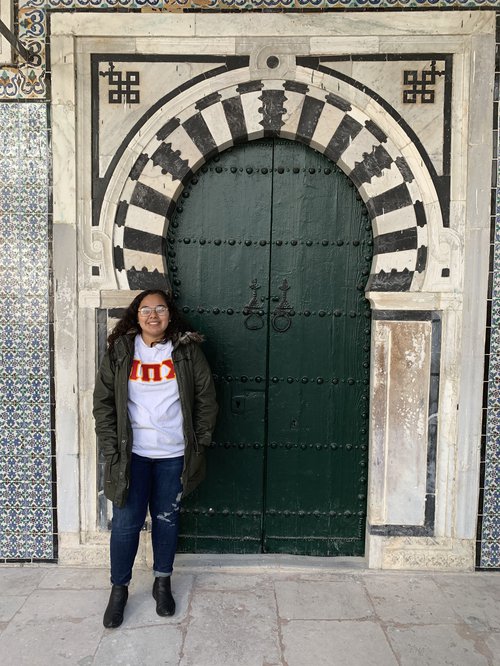How Language Study Led Me to Tunisia
Posted on March 13, 2020
As a Latinx, I am bilingual and have had a huge interest in learning another foreign language. I started by watching YouTube videos of native speakers to see which ones interested me the most and would be feasible. I narrowed my interests down to Chinese or Portuguese or Arabic. When I applied to colleges I made sure to look for a university that offered a variety of foreign language courses and had a great study abroad department. At first, I definitely was discouraged by peers who were monolingual and saw my interests as limiting in terms of a future career. I had a professor encourage me to join the army if I chose to learn Arabic. In the end, this was my future and no one could determine what I would use my language skills for. I took a Chinese course during my first semester of college but did not feel as though that was the place for me. I took Arabic my second year of college and had a completely different experience. I found Arabic to be very similar to Spanish and culturally as well. I felt very supported by the Asian studies department. Arabic is very challenging as there are various dialects and a standard form called “Fusha”. At Carolina, we are asked to choose a dialect along with standard Arabic. I personally like being aware of more dialects but stuck with Egyptian Arabic. In North Carolina, the amount of native Arabic speakers is limited, so I decided that I needed to find a way to practice my Arabic more and studying abroad became the answer to my worries.

I think navigating through the searching process of finding the perfect study abroad program is challenging. Arabic is very diverse and spoken in over twenty-five countries but you will find some travel restrictions in some areas which limit the availability of study abroad programs. Another huge factor is that there are the Middle East and the North African region that have different dialects. A majority of the programs are based in Jordan, Egypt, Israel, Tunisia, and Morocco. In my case, I found that most of the programs available were third-party or exchange. This meant I would face a financial hurdle. An exchange program can be cheap compared to a third-party but you are less likely to find funding for these programs and you will find yourself having to be more independent in the process of immersion. The factor that led me to apply to a third-party is the possibility of scholarships, pell-grant matching opportunity, networks, homestay (language immersion), internship/research, excursions, and availability of advisors on site. Scholarships are available everywhere, it truly lies in oneself to advocate and search. I found so many opportunities through my school, third-party, and outside scholarships such as Diversity Abroad.
As a first time traveler, I thought that having some sort of guidance would be essential and as a minority, I did not know what to expect traveling outside the US. I encourage others to do research and look for their ideal study abroad destinations and make a case if it is not offered at your institution. You will find that study abroad advisors will definitely support your dreams. Do not let systemic barriers limit you to only focusing your studies within the United States. I truly do this day cannot believe I was able to study abroad in two countries at once through the School of International Training. I have been able to immerse myself and have had a unique experience compared to my peers as a person of color. I believe this has allowed me to assimilate more into Tunisia and allowed me to share my own identity with those around me. As this opportunity has been the highlight of my undergraduate experience thus far, I want to encourage others who are fortunate enough to travel to support others like us to strive for their study abroad desires. As a community, we can support one another and share our stories to inspire others. Thank you, Diversity Abroad!
Author: Samantha Rivera
